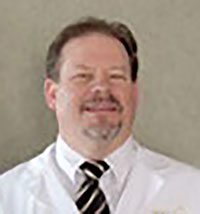Improving the Hospital Experience in Portage County
July 21, 2021
Chief Hospitalist Frank Kelley, MD, winner of a recent “Dinner with the Doc” award, is helping to improve quality and patient experience at UH Portage Medical Center
UH Clinical Update | July 2021
In Portage County, the evolving story at UH Portage Medical Center is one of continuous improvement. Length of stay for hospitalized patients has decreased from 4.5 days to less than 4.0 days, even as case mix index indicating the severity of patient illness has increased. Rates of catheter-associated urinary tract infections (CAUTI) and central line-associated bloodstream infections (CLABSI) have been at zero for more than a year. What’s more, patients’ perceptions of communication with their UH physician during their hospitalization have improved dramatically, from a previous low of 25-30th percentile on the HCAHPS survey now up to 73rd percentile.
 Frank Kelley, MD
Frank Kelley, MDWhat’s the difference? UH leadership thinks one big factor is UH Portage’s Chief Hospitalist and Facility Medical Director, Frank Kelley, MD. In fact, Dr. Kelley was recently honored by UH CEO Cliff Megerian, MD, with a “Dinner with the Doc” award, highlighting these specific and important accomplishments.
When it comes to reducing length of stay, Dr. Kelley says, the improvements at UH Portage have come from a combination of capital improvements, enhanced communication and clear goal-setting.
“A lot our improvements in this area came with hardware improvements in the office,” he says. “We also have monthly meetings where we go over this. People understand what the goal are, and also that these goals actually help the patients. It’s not that people are being asked to do things that they wouldn’t normally want to do. It’s getting everything to align so that everyone has the same goals and wants the same outcomes.”
Dr. Kelley attributes much of the outstanding success with CAUTI and CLABSI rates to nursing initiatives undertaken at UH Portage – initiatives he and his fellow hospitalists are happy to engage with and support.
“It’s really a question of alignment with processes that are being created in the hospital,” he says. “If you always assume that you have the answer to everything, you don’t open yourself up to understanding that someone has already thought about this process and has put some work into this. It’s up to us all get behind this and do it. When we do, we just get much better outcomes.”
As for patients’ HCAHPS scores on “communication with doctors,” Dr. Kelley has a simple explanation for the eye-popping improvement: letting doctors be doctors -- plus investing in critical hospital infrastructure to allow that to happen.
“That got accomplished by having some administrative support that took some of the non-clinical clerical work off the plates of myself and our physicians,” he says. “Our office administrator Ericka Riemenschneider and Associate Site Director Khalid Elamin, MD, have been a tremendous help. Also, we have a very strong clinical team here. It’s probably the best group of clinicians I’ve ever worked with.”
The commitment from the administration at UH Portage and the UH system was crucial, too, Dr. Kelley says.
“We also had an upgrade in our facilities with the help of the administration here,” he says. “Our scores started to improve. They asked us what kind of things we need, and basically the office was remodeled. We got computers that were faster, plus double screens. Some of the problems that arise with the current EMR were difficult to overcome with a single screen. Once we kind of un-tethered our physicians’ hands, that allowed them to put all their effort into what they really want to do, which is patient care. Plus, when patients are happy with their care overall, the ability of the physician to do well on these scores actually is enhanced. The whole team in the hospital helps.”
Dr. Kelley has spent the last 24 years practicing as an internist and hospitalist in Portage County, 18 years at the former Robinson Memorial Hospital and the last six as Robinson has become UH Portage Medical Center. He says he’s very pleased with the positive change UH has been able to effect in a hospital he knows so well.
“It’s been extremely positive from my standpoint,” he says. “I was very happy when UH came to take over the hospital because the resources had dwindled down. The fact that we have an organization like UH that has the expertise, the prestige and the resources is just a great shot in the arm for the hospital. It makes you feel good, and it makes you feel some pride in working here.”


